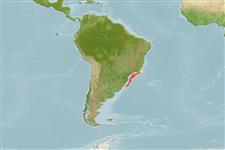Environment: milieu / climate zone / depth range / distribution range
Ekologi
marina bottenlevande; djupintervall 100 - 200 m (Ref. 47377). Subtropical; 22°S - 32°S
Utbredning
Länder | FAO områden | Ekosystem | Förekomster | Point map | Utplanteringar | Faunafri
Southwest Atlantic: Rio de Janeiro (Cabo Frio) to Rio Grande do Sul.
Size / Vikt / Age
Maturity: Lm ? range ? - ? cm
Max length : 23.0 cm TL hane/ej könsbestämd; (Ref. 47377)
Caught with deepwater trawls in depths between 100 and 200 m on the Brazilian shelf (Ref. 47377).
Life cycle and mating behavior
Maturities | Reproduktion | Spawnings | Egg(s) | Fecundities | Larver
Figueiredo, J.L. de, A.P. dos Santos, N. Yamaguti, R.A. Bernardes and C.L. Del Bianco Rossi-Wongtschowski, 2002. Peixes da zona econômica exclusiva da Região Sudeste-Sul do Brasil: Levantamento com Rede de Meia-Água. São-Paulo: Editora da Universidade de São Paulo; Imprensa Oficial do Estado, 242 p. (Ref. 47377)
IUCN Red List Status (Ref. 130435)
Threat to humans
Harmless
Human uses
Fiskeri: saknar intresse
Verktyg
Special reports
Download XML
Internet-källor
Estimates based on models
Phylogenetic diversity index (Ref.
82804): PD
50 = 0.5000 [Uniqueness, from 0.5 = low to 2.0 = high].
Bayesian length-weight: a=0.00525 (0.00322 - 0.00854), b=3.01 (2.87 - 3.15), in cm total length, based on LWR estimates for this species & Genus-body shape (Ref.
93245).
Trofisk nivå (Ref.
69278): 3.5 ±0.3 se; based on size and trophs of closest relatives
Resiliens (Ref.
120179): Mellan, lägsta populationsfördubblingstid 1,4-4,4 år (Preliminary K or Fecundity.).
Fishing Vulnerability (Ref.
59153): Low vulnerability (13 of 100).
